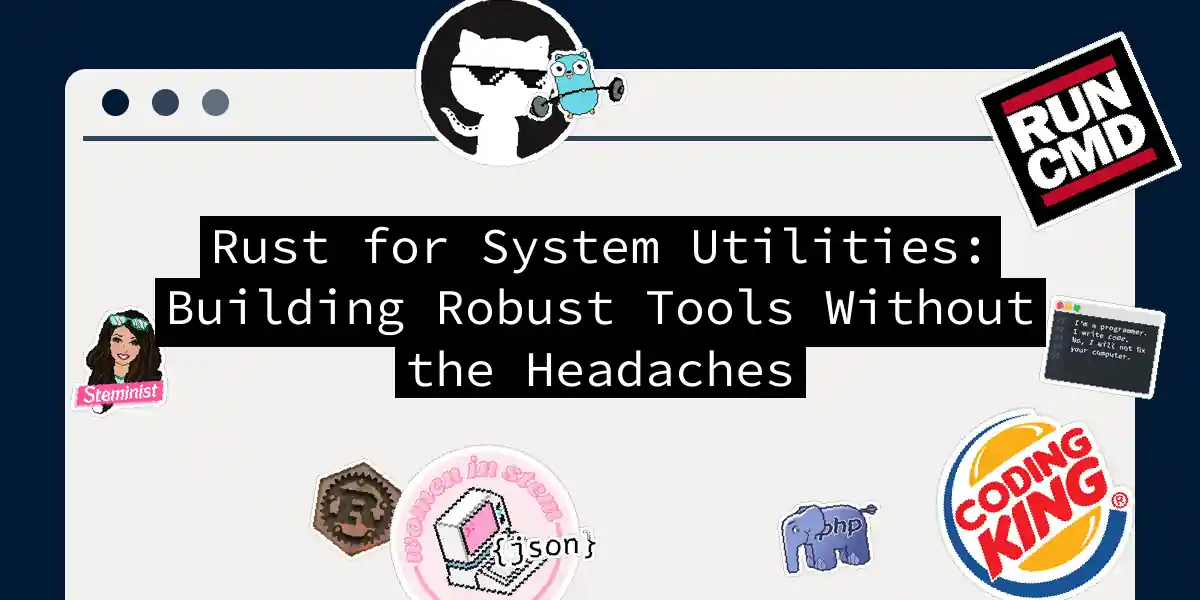Let’s face it: writing system utilities in C feels like performing brain surgery with a sledgehammer. One wrong move and boom – segfaults, memory leaks, and undefined behavior haunting your nightmares. Enter Rust: the language that gives you C-level performance with guardrails that prevent you from coding yourself into a fiery abyss. As someone who’s debugged one too many use-after-free bugs at 3 AM, I assure you – Rust is the sanity-preserving superhero we deserve.
Why Rust Dominates System Tools
Rust combines zero-cost abstractions with compile-time memory safety, making it perfect for resource-constrained environments. Unlike C, where a misplaced pointer can turn your utility into a digital arsonist, Rust’s ownership model enforces discipline:
This diagram shows Rust’s secret weapon: errors caught before runtime. No more deploying tools that work until Tuesday at 2:47 PM. Performance-wise, Rust matches C/C++ while eliminating entire classes of vulnerabilities. In fact, Linux now accepts Rust kernel modules – that’s like vegans approving a steakhouse.
Building a File Scanner: Practical Example
Let’s build scantool – a utility that logs large files. First, create the project:
cargo new scantool
cd scantool
Step 1: Dependencies
Add this to Cargo.toml:
[dependencies]
clap = { version = "4.0", features = ["derive"] }
walkdir = "2.0"
Step 2: Core Logic
Create src/main.rs:
use std::path::Path;
use walkdir::WalkDir;
use clap::Parser;
/// Find files over a given size
#[derive(Parser)]
struct Args {
#[clap(short, long)]
path: String,
#[clap(short, long)]
size: u64,
}
fn main() {
let args = Args::parse();
let target_size = args.size * 1_000_000; // Convert MB to bytes
for entry in WalkDir::new(&args.path) {
let entry = match entry {
Ok(e) => e,
Err(_) => continue,
};
if let Ok(metadata) = entry.metadata() {
if metadata.is_file() && metadata.len() > target_size {
println!(
"🚨 {}: {:.2} MB",
entry.path().display(),
metadata.len() as f64 / 1_000_000.0
);
}
}
}
}
Step 3: Build and Run
cargo build --release
./target/release/scantool --path ~/Downloads --size 100
This scans ~/Downloads for files >100MB, printing paths and sizes. Note how:
walkdirhandles filesystem traversal safelyclapelegantly parses arguments- No manual memory management!
Advanced: Parallel Processing
Rust’s fearless concurrency makes parallel filesystem walks trivial. Add rayon to Cargo.toml:
[dependencies]
rayon = "1.8"
Then modify main.rs:
use rayon::prelude::*;
// ... (previous code)
fn main() {
// ... (arg parsing)
WalkDir::new(&args.path)
.into_iter()
.par_bridge() // Enable parallelism
.filter_map(|e| e.ok())
.for_each(|entry| {
if let Ok(metadata) = entry.metadata() {
if metadata.is_file() && metadata.len() > target_size {
println!("🚨 {}: {:.2} MB",
entry.path().display(),
metadata.len() as f64 / 1_000_000.0);
}
}
});
}
The .par_bridge() transforms sequential iteration into parallel processing with near-zero effort. Try that in C without thread-related migraines!
Debugging Like a Pro
Rust’s toolchain turns debugging into a brisk walk rather than a horror movie marathon:
- Compiler Messages:The error literally shows the problem code with ^^^ indicators.
error[E0502]: cannot borrow `data` as mutable because it is also borrowed as immutable - Built-in Testing:Run tests with
#[test] fn test_file_detection() { // Test setup assert!(find_large_files("test_dir", 10).contains("big_file.bin")); }cargo test– no external harness needed. - Benchmarking:Identify bottlenecks with
#[bench] fn bench_filescan(b: &mut Bencher) { b.iter(|| find_large_files("/real/path", 500)); }cargo bench.
Real-World Wisdom: Lessons Learned
After shipping 20+ Rust utilities, here’s my hard-earned advice:
- Start small: Build a tiny tool first (e.g., log parser) before complex projects.
- Leverage crates.io: Don’t parse arguments manually; use
clap. Need JSON?serdeis your friend. - Embrace the borrow checker: If it feels combative, you’re likely designing against Rust’s strengths.
- Profile mercilessly: Use
flamegraph(install viacargo install flamegraph) to visualize performance.
“Rust makes system programming feel like building with Lego instead of nitroglycerin.” – Me, after replacing 5k lines of C++ without introducing new bugs.
Conclusion
Rust isn’t just “C but safe” – it’s a paradigm shift. You trade pointer arithmetic for:
- ⚡ Compiler-enforced safety
- 📦 Painless dependency management
- 🚀 Fearless concurrency
- 🦀 A mascot that looks like it wants to hug you For system utilities, this means robust tools that don’t crash when users sneeze near them. Our file scanner example took <50 lines with error handling most C projects would envy. Ready to dive deeper? Check out:
- Rustlings for interactive exercises
- The Rust Book for comprehensive learning Now go build something that won’t wake you up at 3 AM. Your future self will thank you with a full night’s sleep and better hair.
